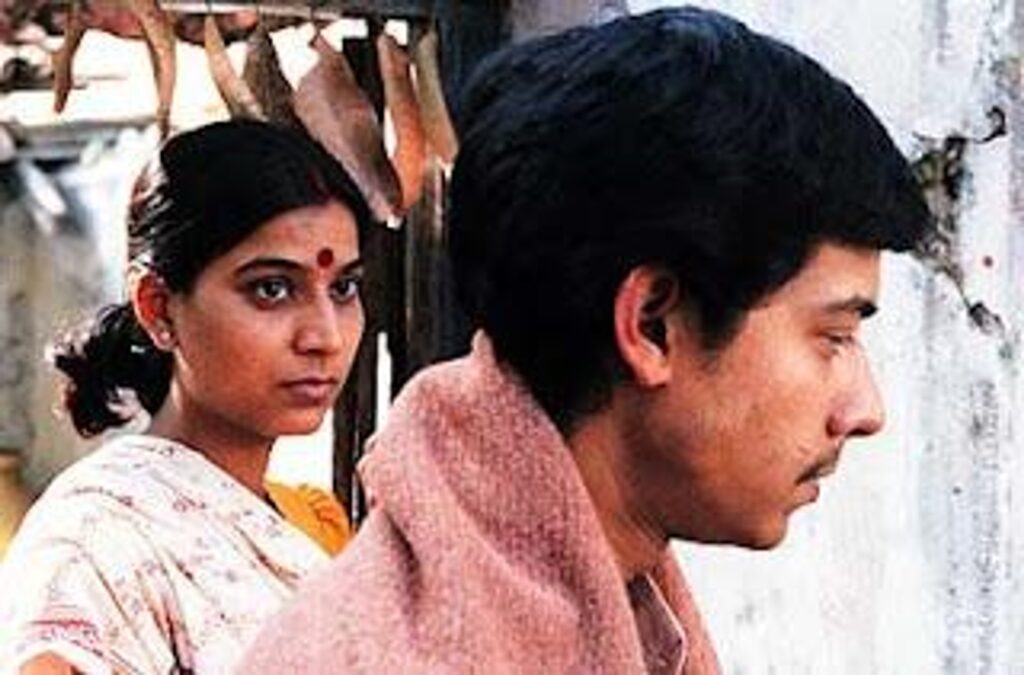Amritesh Mukherjee reviews नौकर की कमीज (The Servant’s Shirt) by विनोद कुमार शुक्ल (published by Rajkamal Prakashan, 2006).
Before entering this baffling, mesmerising, stagnant, volatile and stream-of-consciousness wonder of a novel, I knew few things about Vinod Kumar Shukla’s writing despite having heard him in numerous interviews and articles outside of vague terms like “masterpiece,” “greatest living Hindi author,” “themes of magical realism,” etc., you get the drift. But what no one told me was the idiosyncratic worldview I was going to be absorbed by.
As chronicled in many interviews and features, Shukla isn’t a voracious reader, something that goes against the usual, run-of-the-mill “writing advice,” but unlike what most might assume, it is a feature rather than a bug. It allows him to do what he does best, with minimal (external) technical influences, going against the fashions of language and writing of his time (and ahead). Despite what the world tells us: experience new experiences—places, art, relationships—to write better, learn better, and understand better, his writing is proof that, like everything else, the path to salvation in the world of literature isn’t linear.
Recommended Reading: Shatranj Ke Khilari: Analyzing Satyajit Ray’s Adaptation of Premchand’s Classic
The Rhythms of Life in Vinod Kumar Shukla’s Prose
On the surface, नौकर की कमीज can feel frustrating to read, particularly to modern readers (including yours truly), because of its lack of plot and hyper-realistic narration that describes (more than mimics) life. But as you allow yourself to be swept away, Vinod Kumar Shukla’s poetic writing packs your bags and takes you to a quaint village setting with all its peculiarities and colours and contradictions.
घर बाहर जाने के लिए उतना नहीं होता जितना लौटने के लिए होता है। बाहर जाने के लिए दूसरों के घर होते हैं, दूसरे यानी परिचित, या जिनसे काम हो। जिनके यहाँ उठना-बैठना होगा, या बाज़ार-बगीचा, दफ़्तर-कारख़ाना होगा। लौटने के लिए ख़ुद का घर जरूरी होता है, चाहे किराए का एक कमरा हो या एक कमरे में कई किरायदार हों।
– विनोद कुमार शुक्ल, नौकर की कमीज
मेरी पत्नी के लिए घर, बाहर निकालने के लिए बहुत कम था, इसलिए घर लौटने के लिए भी कम था।
A house is not so much for leaving from as for returning to. For going out there are other peoples’ houses, others meaning people we know, or people with whom we have some work; houses to which we go for a social visit, bazaars or gardens, offices or factories. But for coming back, a home is essential even if it is a single rented room, or a room shared with other tenants.
– Vinod Kumar Shukla, The Servant’s Shirt, translated by Satti Khanna
For my wife the house was not so much a place to come out from and therefore it was not so much a place to go back to.

The quote, taken from the first page of the novel, is the perfect setup for everything that’s to follow. Outside of the rhythmic and poetic prose, one that ebbs and flows, the subtle ease with which he critiques the mannerisms of patriarchal society is something you’d see time and again. After all, isn’t an act of unadulterated observation also an act of critique? From that perspective, नौकर की कमीज, and Shukla’s writing at large, observes and, in turn, critiques the many hierarchies and disparities present in society.
Capturing the Scarcity and Spirit of the 1970s in नौकर की कमीज
नौकर की कमीज follows Santu “Babu,” a junior clerk in the excise department, living in an unnamed town akin to most central Indian towns while trying to understand his place in the world. Through metaphors and observations, Shukla carves out different spaces for the character and the people he interacts with, from his wife to his boss(es) to the peanut seller across the road.
Recommended Reading: A Review of the Hindi Book That Won the International Booker Prize 2022
Like the best observers, his writing also captures the zeitgeist of his times. Published in 1979 by Sambhavna Prakashan, नौकर की कमीज is also the story of pre-liberalisation India, a country with ample shortages and queues, where bureaucracy permeated every faction of the society, and caste and gender lines were more prominent. This scarcity also influences the characters, their actions, their interpersonal dynamics, and the choices they make.
For instance, in the beginning chapters of नौकर की कमीज, Santu’s (our protagonist) house is leaking, the water spilling over everywhere, leaving hardly any room to sleep or manage the household. After he somehow manages to talk to his landlord, the doctor, he’s told to wait for three days of sunlight before repairs can be started. The following pages are simply about Santu and his growing despair at the sun not lingering on the sky for long enough. It might seem mundane, but given the context of the times, and coupled with Shukla’s writing laced with an undertone of wry humour, it comes alive.
सोचने में मैं एक न्यूजरील देखने लगा। एक नई रेलगाड़ी का उद्घाटन समारोह है। डीजल इंजन को फूलों से सजाया गया है। रेलगाड़ी में रंगीन झिल्ली कागज की झंडिया बँधी हैं। गाड़ी के दरवाजों तक में बहुत भीड़ है। इंजन का ड्राइवर, गार्ड, कुली, स्टेशन मास्टर और दिनों की अपेक्षा साफ-सुथरे और फुर्तीले हैं।
यहाँ तक कि पटरियों के बीच में पड़ी हुई गिट्टियों को चूने से पोत दिया गया है। रेलगाड़ी के चलने की आवाज सुनाई दी। देखा, झंडियाँ हवा से फरफराने लगीं। पहले एक लाल झंडी हवा से टूटकर उड़ती हुई पीछे निकल गई। फिर सभी झंडियाँ और सभी फूल टूटकर उड़ते हुए गिर गए। गाड़ी की आवाज को मैंने ‘जबलपुर के छै:-छै: पैसे, जबलपुर के छै:-छै: पैसे’ की लय से बाँधना चाहा तो जमा नहीं।
– विनोद कुमार शुक्ल, नौकर की कमीज
A newsreel began to play in my mind. A new train is to be inaugurated. The diesel engine has been garlanded with flowers. There is bunting along all the coaches. Crowds press against the train. The engine driver, the guard, the station master and the coolies are better dressed than usual and move about briskly.
The pebbles between tracks have been coated with whitewash. The engine makes a groan. The bunting slaps loudly against metal. A triangular red flag breaks off and flies behind. Now other flags and flowers snap and fly from the train. I match the lyric ‘Jabalpur-ke-chhe chhe paise / Jabalpur-ke-chhe chhe paise,’ to the sound of the coaches; the fit is imperfect.
– Vinod Kumar Shukla, The Servant’s Shirt, translated by Satti Khanna
Mani Kaul’s Cinematic Interpretation of Shukla’s Vision

A word about Mani Kaul’s adaptation of the same name. I have a soft spot for directors loyal to the source material. And with Vinod Kumar Shukla handling the screenplay department, नौकर की कमीज (the movie), to my surprise, captured the book’s core seamlessly. Whether it’s the stillness of the characters and their actions, the slow mundanity and attractiveness of regular life of regular people, or the observations about society and its contradictions, the movie manages to translate an essentially un-translateable novel. If you’ve read the source material, the adaptation (starring Pankaj Sudhir Mishra, Anu Joseph and Om Prakash Dwivedi) adds new, interesting contours to enrich your relationship with the story further.
Recommended Reading: Vikram Seth’s Hanuman Chalisa: A Modern Translation of a Timeless Hymn
Conclusion
Vinod Kumar Shukla’s नौकर की कमीज or The Servant’s Shirt is the perfect debut novel for Shukla, with his characteristic style and sharp eye for detail. It’s poetry in prose and a chronicling of life in all its (simultaneous) stillness and vivacity, a stark contrast to the hustle-bustle of our modern lives. The book is not meant to be read cover-to-cover like binge-watching an OTT series; instead, read it bit by bit, enjoying the ठहराव (a state of equilibrium), like sipping your favourite cup of tea every morning, a routine you’ve built over the years.
Have you read this novel exploring mesmerizing prose and blending poetic rhythm with social observations? Share your thoughts with us in the comments below!





















